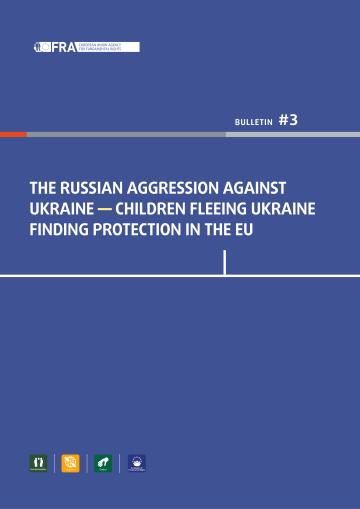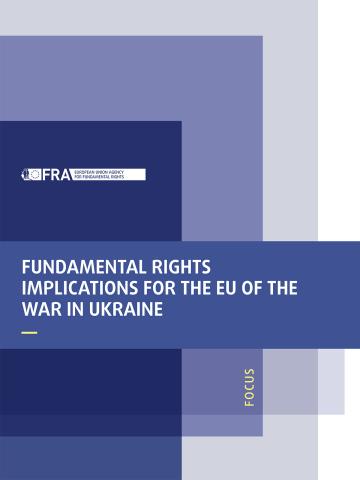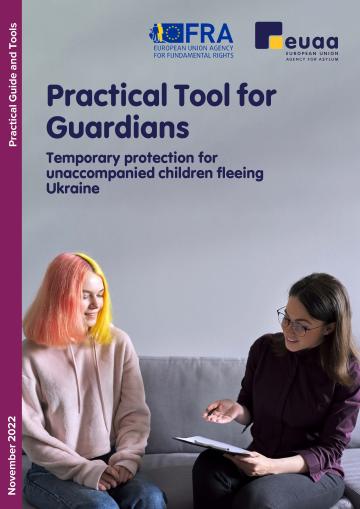Following the Russian invasion of Ukraine and the activation of the TPD, challenges pertaining to the national child protection systems within the EU quickly became apparent. Pre-existing issues in the establishment and functioning of these systems were exposed and further exacerbated as over a million children fled Ukraine and arrived in EU Member States. Despite being entitled to a wide range of rights under the TPD, the reality for people arriving from Ukraine revealed barriers that prevented their access to those rights.
Temporary protection in the EU for those fleeing Ukraine will continue until 4 March 2024, and the European Commission has already announced plans to extend this until March 2025. To effectively implement their obligations under the TPD and various international instruments, Member States must secure the child’s best interests and wellbeing by ensuring swift access to specific rights. To this end, efforts to implement the EU Strategy on the Rights of the Child and the European Child Guarantee now hold even greater significance. One critical step is that all Member States develop their national action plans for the European Child Guarantee, addressing challenges faced by children with a migrant background, including refugee children and children displaced from Ukraine. As recommended in FRA’s 2023 Fundamental Rights Report, the implementation of the national plans should be scrutinised by the European Commission and relevant monitoring outcomes included in the European Semester process.
Across the EU, measures are being implemented at both the national and local level to facilitate Ukrainian families’ access to essential aspects of child welfare, including education and healthcare. Recognising the ongoing challenges faced by families and children displaced from Ukraine, the European Commission and respective Ukrainian ministries have taken concrete steps for more effective and sustained coordination in education and cooperation on health. However, as this bulletin shows, further efforts are required so that children can fully access and enjoy the rights they hold under the TPD, and under international and European human rights law.
- As children displaced from Ukraine commence a second academic year in new cities and communities, national and local authorities need to intensify efforts to increase registration and attendance throughout the 2023/2024 academic year. Integration efforts in mainstream schools and childcare facilities must also be escalated. Yet another year of interruptions to their education could have a devastating impact on children’s wellbeing, social skills and mental health and result in a ‘lost generation’ in terms of education, training and basic skills.
- Accessible and affordable trauma support and counselling remain crucial. Children displaced from Ukraine have endured 18 months of displacement, separation from family and close relatives, and experiences of stress and being under threat. Moreover, this immediately follows the disruption, uncertainty and fear induced by the Covid-19 pandemic. Efforts to overcome the general shortage of mental health support and rehabilitation services in Member States, and to address additional challenges such as the language barrier faced by people displaced from Ukraine, should be sustained and increased.
- The protection of unaccompanied and separated children requires a specific and targeted response from Member States. This involves functional guardianship systems that safeguard the well-being and best interests of children in all aspects of their lives. Investing in the effectiveness of guardianship systems in the EU is necessary in order to ensure that all children finding refuge in the EU – from Ukraine as well as from other third countries – have access to and receive the support, services and protection to which they are entitled.
- The situation for children arriving from Ukrainian institutions deserves continued care and particular attention. The institutionalisation of children in large facilities is not an appropriate solution. EU Member States should not backtrack on the progress made on deinstitutionalisation and should provide children displaced from Ukraine with community-based, individualised care. If institutional settings are used in a temporary capacity, oversight by national child protection authorities is critical, to ensure that national standards are upheld in the care provided to the children. Consideration should be given to children with disabilities to ensure that their specific needs for accessibility, inclusion and additional support are duly addressed.
Crucially, the lack of up-to-date and comprehensive child-related data is concerning. It hinders the development of evidence-based policy design and targeted support and raises concerns about the circumstances of children who have fled Ukraine. Across all Member States and within EU institutions, there must be increased and committed efforts to collect robust data on different categories of children, disaggregated by age and sex. This data would facilitate the design and implementation of tailored policies and measures that cater for distinct risks and needs for protection. Without such data, some children who are already facing difficult circumstances might be deprived of the protection and support they are entitled to.
In the coming months and years, authorities in EU Member States and in Ukraine will need to take coordinated decisions regarding the future of children who fled Ukraine. It remains unknown when it will be safe enough to return to Ukraine. Alongside that, questions remain as to whether returning to Ukraine would be in the children’s best interests.
When temporary protection ends, the TPD states that the general laws on protection of people, so called ‘aliens’, in the Member States apply (Article 20). This Directive also outlines provisions for voluntary return (Article 21) and enforced return (Article 22). The latter includes an obligation on Member States to take measures to ensure that the enforced return of persons whose temporary protection has ended and who are not eligible for admission is conducted with due respect for human dignity. Any measures related to return need to take into consideration the best interests of the child (Article 15 (4)).
FRA’s 2023 Fundamental Rights Report suggests that Member States should establish meaningful legal pathways to facilitate a smooth transition from temporary protection status to other protection statuses under either EU or national law. The European Commission proposed various models for extending residence and work permits, or for creating conditions to transition to other legal statuses.
The UN Committee on the Rights of the Child, in its general comment on children in migration contexts, stresses that decisions regarding a child’s return to their country of origin must take into account individual circumstances and the child’s best interests. The comment explicitly states that return is not the only solution; alternatives such as further integration into the country of residence or resettlement to a third country should also be considered. Moreover, according to the CRC Committee, plans should be discussed and developed with the child in a child-friendly and sensitive manner.
Council of Europe Member States committed to provide displaced children with opportunities to participate in decisions that affect them in the Reykjavik Declaration, ‘United around our Values’. FRA’s guide on children deprived of parental care found in an EU Member State other than their own provides guidance on how to define durable solutions in the case of unaccompanied children.
Some of the children displaced in the EU have already returned to Ukraine, which has drawn criticism from civil society. According to the Child Circle/UNICEF report some returns from institutions to Ukraine were carried out in a sudden way, reportedly without transparent decision-making procedures or a clear process for supporting individual children in the process.
Ukraine has recently adopted a decree stating that the return of children in residential care who were evacuated should only occur after the end of martial law. The decree establishes a centralised system for making decisions on return decisions, requiring prior approval from the central government for returning Ukrainian children from institutions.
For children evacuated from institutions and children with disabilities, it is essential that reform efforts continue to establish comprehensive deinstitutionalisation. The Council of Europe reiterated their support for such reform and the European Commission is similarly supportive of Ukraine’s plans to move away from institutionalisation and develop a modern alternative care strategy.
Discussions about the reconstruction of Ukraine have already begun. At the heart of those discussions there must be an acknowledgement of the need to respect, protect and fulfil the rights of the child, including their rights to health, education, family life, participation, adequate standard of living, and protection against abuse and harm. Both the EU and its Member States should commit to providing support to Ukraine in this endeavour. For as long as children from Ukraine remain in the EU, Member States should strive to ensure children have access to these same rights, in the hope that they experience a healthy, safe and happy childhood.











